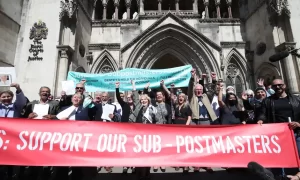
UK Wage and Price Growth Set to Slow, Bolstering Case for Interest Rate Cut
Businesses in the UK are planning to moderate both wage and price increases over the coming year, potentially paving the way for a reduction in interest rates this summer. This trend was highlighted in the Bank of England’s latest decision-maker panel survey.
According to the survey, companies intend to raise pay by an average of 4.1 percent, a decrease from the 4.6 percent forecast in April. Similarly, prices charged by businesses, a key indicator of future inflation expectations, are predicted to rise by 3.8 percent over the next year, down from a previous forecast of 4.2 percent.
These figures suggest that businesses believe inflationary pressures are easing, potentially leading to lower wage demands from workers. Data from the Office for National Statistics indicates that wages have been increasing at an average rate of around 6 percent over the past year.
The Bank of England is currently considering when to implement its first interest rate cut since March 2020, following a series of increases that have brought the base rate to 5.25 percent, a 16-year high. The latest inflation data, which showed a decrease to 2.3 percent in April from 3.2 percent in March, has exceeded the Bank’s forecasts.
Although services inflation—a critical measure of domestic inflation trends—dropped slightly to 5.9 percent from 6 percent, it remained higher than expected. This sector’s inflation is closely monitored by the Bank for signs of underlying inflationary pressures within the economy.
Speculation among investors suggests that borrowing costs could be reduced over the summer, potentially as early as August, if further data confirms a continued decrease in price growth towards the Bank’s 2 percent target. Recent data indicated that inflation in the services sector has slowed to its weakest pace in three years.
Rob Wood, chief UK economist at Pantheon Macroeconomics, noted, “The decision-maker panel joins a clutch of surveys in signalling that tight monetary policy continues to bear down on inflation pressure. Easing inflation and recruitment difficulties well down from last year suggest that ratesetters can begin gradually easing the restrictiveness of monetary policy soon. We expect [the Bank’s ratesetting monetary policy committee] to cut Bank rate by 25 basis points in August and again in November.”
The anticipation of these adjustments reflects growing confidence that the UK economy is stabilising, providing the Bank of England with the scope to start easing monetary policy in the coming months.
Read more:
UK Wage and Price Growth Set to Slow, Bolstering Case for Interest Rate Cut


